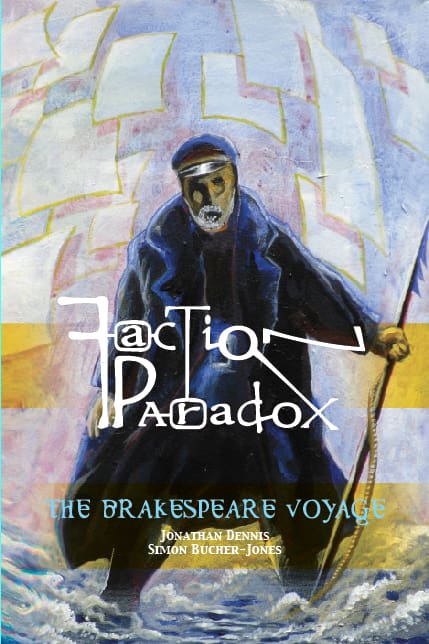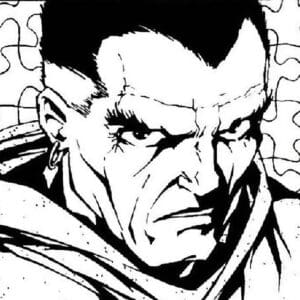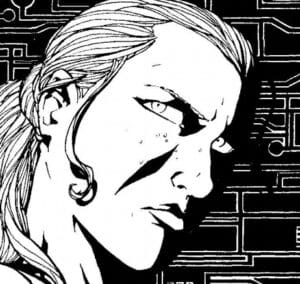
Faction Paradox
The Brakespeare Voyage
Sets:
Faction Paradox Novels
Reviews and links from the Community
This review contains spoilers
Review of The Brakespeare Voyage by glass_shard
Faction Paradox initially attracted me as a franchise because of its lore, its big-idea scifi worldbuilding, and the rich cultures it told stories of; as I progressed in my readthrough and discovered the diversity of stories and themes the series had to offer, I found a lot more to enjoy, but the worldbuilding remained the big draw. It also happens that I'm a sucker for the nautical æsthetic. Seeing as Jonathan Dennis and Simon Bucher-Jones's The Brakespeare Voyage has both of these things in droves, it follows that my loving it was pretty much an inevitability – and it doesn't hurt that it's also a really good book.
This is the first Faction Paradox novel to be co-authored by two different writers, and the structure is very much dependent on this fact. Half of the book (the side mostly helmed by Bucher-Jones) follows Robert Scarratt, a member of the Great Houses who's sent on a wild goose chase through the void between universes, piloting the Brakespeare – a timeship containing the timeline of a whole artificial galaxy. His chapters are mostly composed of vignettes from his journey as he reflects on his life and realizes how much he's being used as a pawn in someone else's grand scheme. Meanwhile, on the other side of the coin, you have Dennis's chapters, following Nebaioth: a man born to one of the Brakespeare's many worlds devoted to supplying the Voyage, he has memories of a timeline where Scarratt was never the Captain, and resolves himself to deposing Scarratt and restoring the original Captain of the Brakespeare. None of this goes according to plan.
If that comes off as a dense premise, well... the fun part is that it's barely the tip of the iceberg. Every time I attempted to summarize the book's plot to someone new, my explanations got longer and longer, as I progressed through the book and slowly uncovered more of the underlying causes and events at play. But through its complexity, one of The Brakespeare Voyage's most admirable qualities is that the density never becomes a roadblock to comprehension. Wading through rewritten timelines, a myriad of fictional cultures, and inscrutable alien technologies, it remains shockingly easy to follow throughout. It has the same penchant for dense storytelling and worldbuilding shared by its siblings Newtons Sleep and Against Nature (only natural given they all had development time at Random Static Ltd), but the difference lies in that The Brakespeare Voyage drip-feeds the reader the complexities as it goes along, taking things slow and letting the details sink in. Naturally, there are vaguenesses and mysteries to speculate on, but they're of an approachable scale when set against everything else that is explained clearly.
More than just being an aid to comprehension, this slow pace helps the book as a whole. I mentioned earlier on that The Brakespeare Voyage goes all-out with the worldbuilding, and plenty of that is expanding on concepts from The Book of the War, but a lot more of it takes the form of the Brakespeare itself. Nebaioth journeys across many corners of the Ship, starting from the small seaside town he grew up in and ending up in the far-future Bridge, a vast metropolis that the people of the Brakespeare spent millennia galvanizing their planets to build, and from which Scarratt guides the Ship. The Bridge is perhaps the best example of the stunning scale of the Brakespeare: entire cultures and religions based around furthering the Voyage, working for æons and culminating in a beautiful galaxy-wide display of architecture and culture, if one that's also a little existentially nerve-wracking. Its depiction is frankly incredible, an awe-inspiring structure on the face of it that's made all the more impressive due to the reader's time spent soaking in the culture it sprang from. Throughout the book, and especially in Nebaioth's chapters, the Brakespeare takes enough of the spotlight that said ship itself might as well be the main character.
And that's the thing about Nebaioth's chapters – he himself isn't that complex a character. He has one big goal in mind, and it leads him through about three-quarters of a hero's journey: the call to adventure, a supernatural mentor, a big turning point and trial partway through, and his ultimate rise in power as he nears his goal. The most compelling aspect of him is this singlemindedness, as his goals shift and warp over time and he falls prey to his own ingrained biases. His story's myth-style emphasis on plot over character is reminiscent of Warlords of Utopia, and it's even got the same kind of sudden timeskips – but none of that is much of a bother here. The setting is the star of the show, and it has more than enough personality to make up for Nebaioth's one-and-a-half-dimensionality and leave that side of the story feeling fleshed-out.
Still, Nebaioth's sections on their own can get a little dry. And that's where the co-authoring comes in clutch: Robert Scarratt's sections are completely different from Nebaioth's. For one, Scarratt himself comes from a wildly different cultural background, and has a much different perspective on the Brakespeare's voyage, which does enough to differentiate him; and the narration style is dramatically different due to his personality. He's a seedy, misogynist, generally abrasive man, which means that you love to hate him – his chapters can be hard to read, but at the same time it's fascinating just to look inside his mind. Scarratt's sections are very structurally different from Nebaioth's, too; they're presented as a military briefing file collected from his memories, and scattered throughout are vignettes from other characters, occasional official comments, and various moments from earlier in his life. It all coalesces into an inevitably incomplete yet continuously captivating patchwork tapestry of the life of Robert Scarratt.
The contrast between these two protagonists is the big strength of The Brakespeare Voyage. There are two different sides to it, and neither feels totally complete – the characters aren't the most likeable, and one story is a pinch too straightforward while the other one can feel disarmingly disparate in its vignettish style. I could certainly enjoy a whole book of just one side or the other, but they're very much designed to complement each other. Each half draws you into a character and their world and then switches it up when you're at maximum interest levels, right before it starts to get to be too much. It's a beautiful balancing act, taking full advantage of the collaborative nature of the book. These are two different stories in different styles, yet they intertwine beautifully.
And that brings me to the climax, as the disparate plot threads gradually pool together to make one big whole. That sort of thing is nothing new, especially not for Faction Paradox, a series that's always absolutely adored this story structure – but it's particularly expertly done here. Each perspective retains a distinct identity, making the way they complement each other that much more standout, until the two eventually merge together in, ah, more ways than one. The ending in general is a big interpretive mindf**k that synthesizes everything up til then in a colorful explosion of prose, and it's both baffling and tremendously entertaining. I'll be thinking about that moment, what it means for the characters, what it means for the setting, and what it means for the themes, for a while yet.
(And as an aside – after the women in the storyline had been set aside for a lot of the book, I felt vindicated to see they were the ones that escaped and had the best chance at making a life for themselves. It didn't negate the book's somewhat gender-exclusionary nature, but it certainly did soften the blow.)
That ending is the cherry on top to what is, without a doubt, the best Faction Paradox book overall that I've had the pleasure of reading and subsequently reviewing. It's got the complex worldbuilding that still manages to flow, it's got engaging characters and settings, and it's got a unique and deftly-assembled structure to boot. Just a fantastically solid read all around. Oh, and I like the nautical motif. Did I mention I like the nautical motif?
Community Ratings
(Updates coming soon:)
Add the last X members who rated it here
Add number of Favs, and who they are, here



